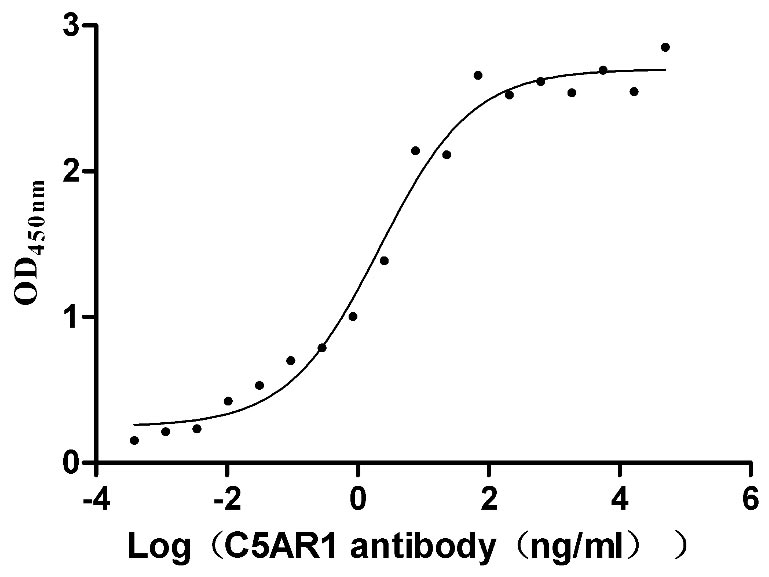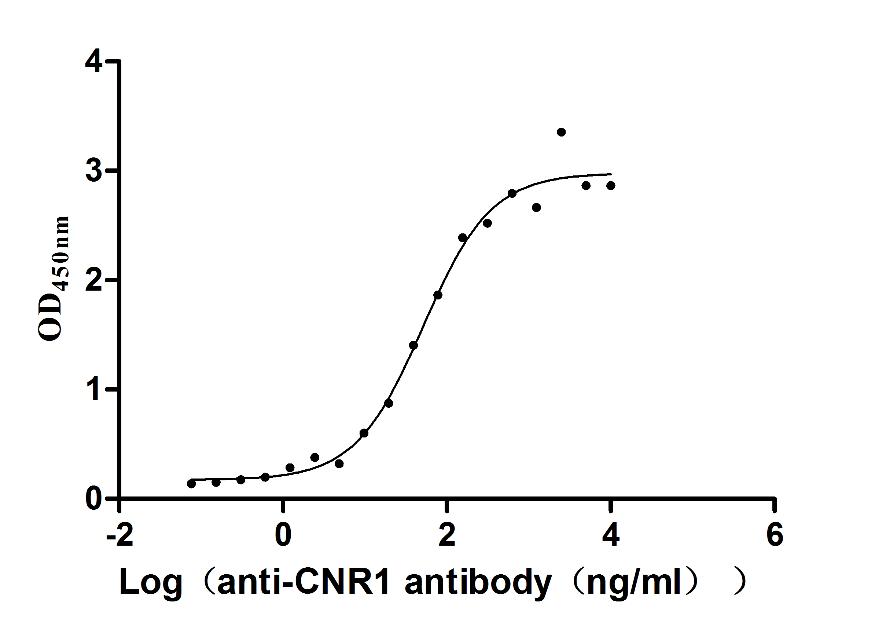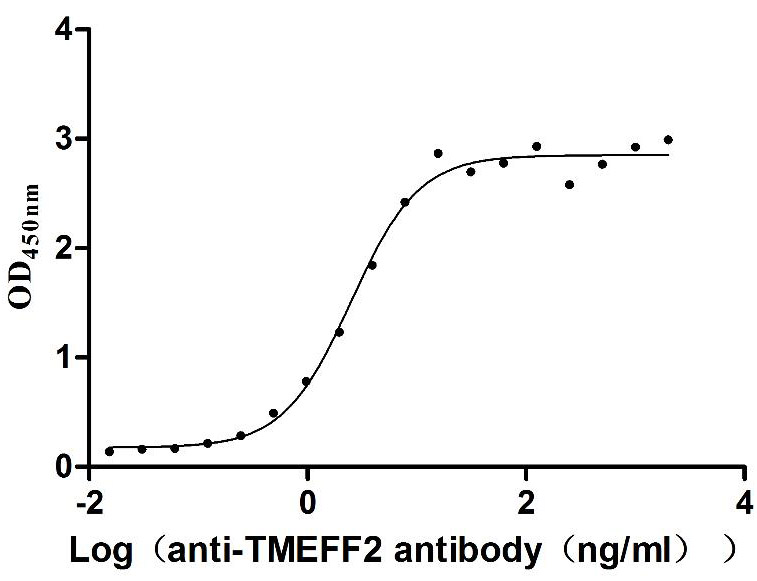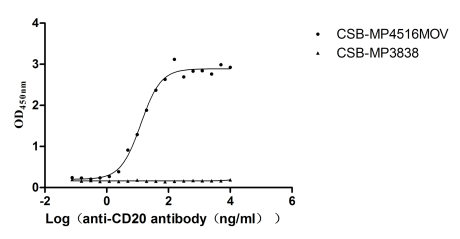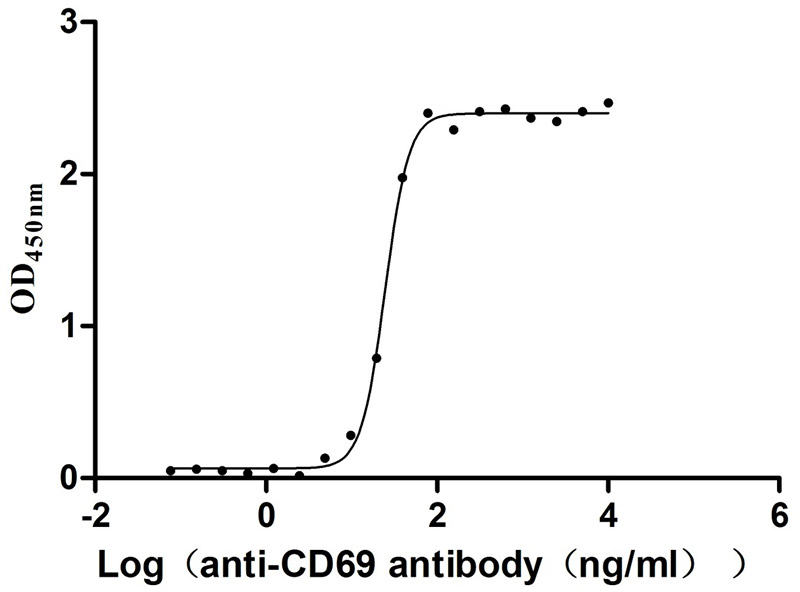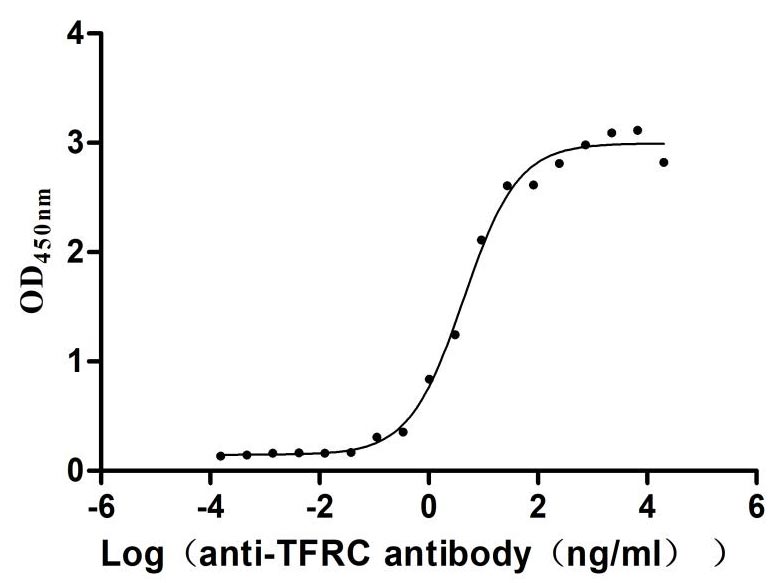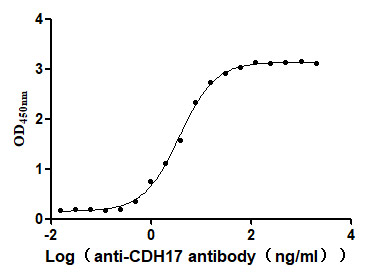Recombinant Mouse C-C chemokine receptor type 9 (Ccr9), partial
-
货号:CSB-YP894369MO1
-
规格:
-
来源:Yeast
-
其他:
-
货号:CSB-EP894369MO1
-
规格:
-
来源:E.coli
-
其他:
-
货号:CSB-EP894369MO1-B
-
规格:
-
来源:E.coli
-
共轭:Avi-tag Biotinylated
E. coli biotin ligase (BirA) is highly specific in covalently attaching biotin to the 15 amino acid AviTag peptide. This recombinant protein was biotinylated in vivo by AviTag-BirA technology, which method is BriA catalyzes amide linkage between the biotin and the specific lysine of the AviTag.
-
其他:
-
货号:CSB-BP894369MO1
-
规格:
-
来源:Baculovirus
-
其他:
-
货号:CSB-MP894369MO1
-
规格:
-
来源:Mammalian cell
-
其他:
产品详情
-
纯度:>85% (SDS-PAGE)
-
基因名:
-
Uniprot No.:
-
别名:Ccr9; Cmkbr10; C-C chemokine receptor type 9; C-C CKR-9; CC-CKR-9; CCR-9; Chemokine C-C receptor 10; CD antigen CDw199
-
种属:Mus musculus (Mouse)
-
蛋白长度:Partial
-
蛋白标签:Tag type will be determined during the manufacturing process.
The tag type will be determined during production process. If you have specified tag type, please tell us and we will develop the specified tag preferentially. -
产品提供形式:Lyophilized powder
Note: We will preferentially ship the format that we have in stock, however, if you have any special requirement for the format, please remark your requirement when placing the order, we will prepare according to your demand. -
复溶:We recommend that this vial be briefly centrifuged prior to opening to bring the contents to the bottom. Please reconstitute protein in deionized sterile water to a concentration of 0.1-1.0 mg/mL.We recommend to add 5-50% of glycerol (final concentration) and aliquot for long-term storage at -20℃/-80℃. Our default final concentration of glycerol is 50%. Customers could use it as reference.
-
储存条件:Store at -20°C/-80°C upon receipt, aliquoting is necessary for mutiple use. Avoid repeated freeze-thaw cycles.
-
保质期:The shelf life is related to many factors, storage state, buffer ingredients, storage temperature and the stability of the protein itself.
Generally, the shelf life of liquid form is 6 months at -20°C/-80°C. The shelf life of lyophilized form is 12 months at -20°C/-80°C. -
货期:Delivery time may differ from different purchasing way or location, please kindly consult your local distributors for specific delivery time.Note: All of our proteins are default shipped with normal blue ice packs, if you request to ship with dry ice, please communicate with us in advance and extra fees will be charged.
-
注意事项:Repeated freezing and thawing is not recommended. Store working aliquots at 4°C for up to one week.
-
Datasheet :Please contact us to get it.
相关产品
靶点详情
-
功能:Receptor for chemokine SCYA25/TECK. Subsequently transduces a signal by increasing the intracellular calcium ions level.
-
基因功能参考文献:
- these results showed a site- and cell-specific expressions of Ccl25 and its receptor Ccr9 within both maternal and embryonic compartments of implantation sites and suggested a role in inducing specific Ccr9+ leukocytes at the maternal-fetal interface during the initial steps of embryo implantation in the mouse model PMID: 29154408
- Abrogation of CCR9 improved the post-myocardial infarction survival rate and left ventricular (LV) dysfunction and decreased the infarct size. The data reveal that CCR9 serves as a novel modulator of pathological progression following myocardial infarction through NF-kappaB and MAPK signaling. PMID: 27585634
- Pressure overload-induced hypertrophy was greatly attenuated by CCR9 deficiency in cardiac-specific CCR9 knockout mice, whereas CCR9 overexpression in cardiac-specific transgenic mice strikingly enhanced cardiac hypertrophy. PMID: 27146447
- CCR9 and CCL25 expressions are induced in the early stages of airway inflammation and they have an important role modulating eosinophils and lymphocytes recruitment at the first stages of inflammatory process PMID: 27795621
- CCR9 and Integrin-beta7 expression has a differential effect on graft fate during acute graft-versus-host disease (GVHD) of the liver depending on the GVHD target tissue. PMID: 26348893
- data indicate that in addition to acting as a gut-homing molecule, CCR9 signaling shapes immune responses by inhibiting Treg cell development PMID: 26230654
- Data suggest that blocking CC chemokine receptor 9 (CCR9) may represent a novel safe therapy for rheumatoid arthritis (RA). PMID: 25248373
- activation of Notch1 has a dominant-negative effect on Ccr9 transcription and that Notch1 and E proteins control the dynamic expression of Ccr9 during T cell development. PMID: 25710912
- CCR9/CCL25 is involved in acute skin transplantation rejection and anti-CCL25 strategies might be useful in preventing acute rejection. PMID: 23456208
- Accumulated CD11b(+) macrophages are critical for activating hepatic stellate cells through the CCR9/CCL25 axis and therefore promote liver fibrosis. PMID: 23460364
- CCR9-expressed plasmacytoid dendritic cells are possibly small intestine regulatory, antigen-presenting cells that suppress intestinal inflammation. PMID: 22626536
- CCR9 is required for recruitment of peritoneal macrophages in the steady state to control systemic sepsis during early phases of peritoneal infection. PMID: 22771342
- Data show that chemokine receptor CCR9(-/-) knockout mice developed a chronic inflammatory response with over-expression of the cytokines and chemokines. PMID: 22633147
- characterization of expression and thymus-expressed chemokine responsiveness of the murine thymus, spleen and mesenteric lymph node PMID: 22196895
- CCR9(+) macrophages contribute to the induction of acute liver inflammation in mouse models of hepatitis. PMID: 22079594
- CCL25/CCR9 interactions regulate inflammatory immune responses in the large intestinal mucosa by balancing different subsets of dendritic cells. PMID: 21283540
- Signaling of the chemokine CCL25 through its receptor CCR9 induces Tregs to migrate to the intestine. PMID: 21300065
- CCR9+ Th cells are a subset of IL-21-producing T helper cells that influence regional specification of autoimmune diseases that affect accessory organs of the digestive system PMID: 21511186
- Critical role of chemokine receptor signaling in thymic settling. PMID: 19965655
- A previously unrecognized role of CCR7 in progenitor seeding of the adult thymus, which is largely masked by compensatory effects of CCR9 signals. PMID: 20040757
- Characterization of CCR9 expression during T cell development PMID: 11751956
- CCR9 plays an important, although not indispensable, role in regulating the development and/or migration of both alphabeta negative and gammadelta negative T lymphocytes. PMID: 11884450
- in vivo neutralization of the CCR9 ligand, CCL25, reduced the ability of activated CCR9(+) CD8alphabeta(+) lymphocytes cells to populate the small-intestinal epithelium PMID: 12393847
- mice doubly deficient for chemokine receptors CCR7 and CCR9 were defective specifically in fetal thymus colonization before, but not after, thymus vascularization PMID: 16809609
- fms-like tyrosine kinase receptor-3 signaling is required for the generation of T lineage-competent progenitors, which selectively express molecules, including CCR9 PMID: 17277104
- CCR9 is a homing receptor for plasmacytoid dendritic cells to the small intestine. PMID: 17404233
- Demonstrate development of intestinal inflammation in Tnf(DeltaARE) mice is critically dependent on beta7 integrin-mediated T-lymphocyte recruitment. the function of the CCL25/CCR9 axis appears dispensable in this model. PMID: 18439426
- CCR9 is expressed on gut-homing T cells after stimulation by dendritic cells from Peyer's patches, but not DC of other tissue origins, thereby imprinting gut homing specificity onto memory T cells specific for gut-antigens. PMID: 12840763
- This gene is a mouse CCR9. See also GenBank files AJ132336 and AJ131357. PMID: 10229797
显示更多
收起更多
-
亚细胞定位:Cell membrane; Multi-pass membrane protein.
-
蛋白家族:G-protein coupled receptor 1 family
-
组织特异性:Highly expressed in the thymus and low in lymph nodes and spleen.
-
数据库链接:
KEGG: mmu:12769
STRING: 10090.ENSMUSP00000126758
UniGene: Mm.440604
Most popular with customers
-
Recombinant Human C5a anaphylatoxin chemotactic receptor 1 (C5AR1)-VLPs (Active)
Express system: Mammalian cell
Species: Homo sapiens (Human)
-
Recombinant Human Cannabinoid receptor 1 (CNR1)-VLPs (Active)
Express system: Mammalian cell
Species: Homo sapiens (Human)
-
Recombinant Human Desmoglein-3 (DSG3), partial (Active)
Express system: Baculovirus
Species: Homo sapiens (Human)
-
Recombinant Human Tomoregulin-2 (TMEFF2), partial (Active)
Express system: Mammalian cell
Species: Homo sapiens (Human)
-
Recombinant Macaca fascicularis Membrane spanning 4-domains A1 (MS4A1)-VLPs (Active)
Express system: Mammalian cell
Species: Macaca fascicularis (Crab-eating macaque) (Cynomolgus monkey)
-
Recombinant Human Early activation antigen CD69 (CD69), partial (Active)
Express system: Mammalian cell
Species: Homo sapiens (Human)
-
Recombinant Human Transferrin receptor protein 1 (TFRC), partial (Active)
Express system: Mammalian cell
Species: Homo sapiens (Human)
-
Recombinant Human Cadherin-17 (CDH17), partial (Active)
Express system: Mammalian cell
Species: Homo sapiens (Human)


